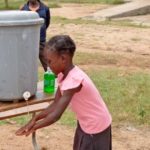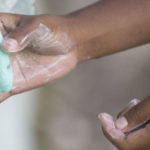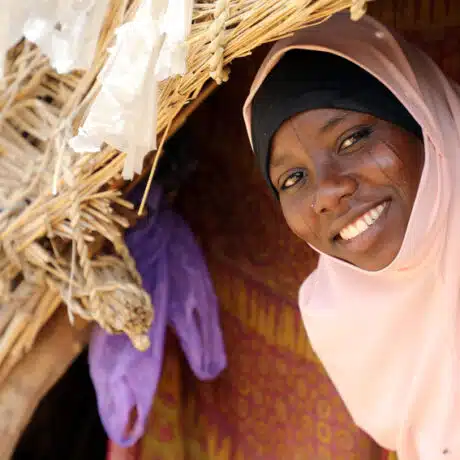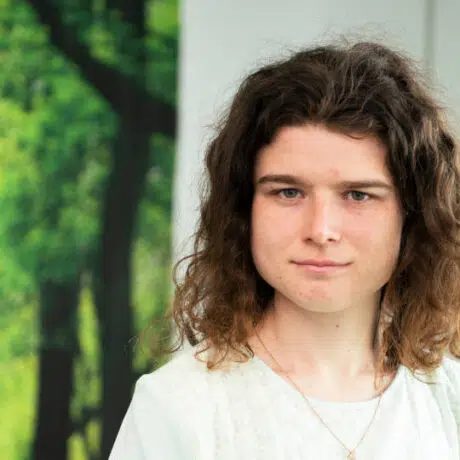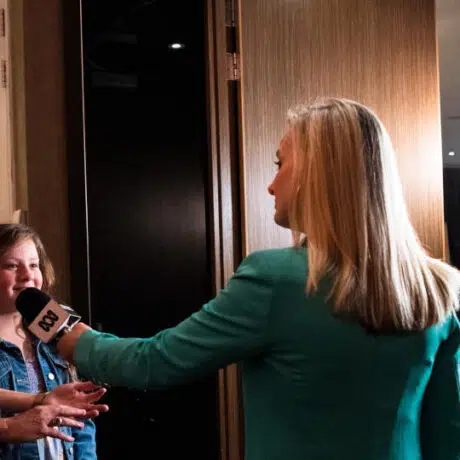News and Stories - Girls Rights - 9 June 2020
FGM Stories: Khadija Taking a Stand

“We’re like sitting ducks”: Female Genital Mutilation is a “silent” but rife girls’ rights violation and COVID-19 has made it a whole lot worse
By Khadija Gbla, anti-FGM campaigner and Plan International Australia supporter
Every single day – whether in Melbourne or Mogadishu, Khartoum or Kuala Lumpur – young girls and women are undergoing female genital mutilation (FGM), a horrific human rights violation.
The World Health Organisation estimates three million girls are at risk of FGM each year.
Mostly carried out between infancy and the age of 15, FGM involves the partial or total removal of the external genitalia and sometimes sees the vaginal opening sewn up in an excruciating practice called infibulation.
Right now, more than 200 million girls and women in 30 countries worldwide have been subject to this cruel practice, many of whom live in Africa, the Middle East and Asia.
But there are many “silent” cases happening across Europe, the US and right here in Australia too.
I am one of those 200 million girls.
I was three years old when war broke out in my home country of Sierra Leone. Bombs were dropping everywhere so my family escaped, finding refuge in Gambia, another country in Western Africa. We had no idea what was going to become of our lives. My mother applied for refugee status and luckily, we were accepted in to Australia in 2001.
Not long before we were due to travel to the other side of the world, my mum came home one day and told me we were going on a little trip. We bundled into a car and drove for hours into remote bushland, eventually stopping at two little huts. I was really confused. The next thing I knew an old lady walked out and ushered us into one of the huts. My mother took off my clothes and pinned me on the floor as I tried to wrestle her off me.
Then, the old lady came towards me with a rusty, sharp knife. I honestly thought they were going to kill me. Instead, she slid down my body and began to cut away at what I now know was my clitoris, inch by inch. I screamed and cried and asked my mum for it to stop, for the pain to stop, but all she said was: “be quiet”.
They left me there bleeding, crying and confused. We never talked about this again.Soon, we arrived in Australia, just as the Sydney Olympics were starting. Settling in was hard, but it became even harder when I started to volunteer for an organisation called Women’s Health Statewide. By chance, I joined the group’s FGM program without any awareness of what it was actually about. Shock and trauma had repressed my memories of what happened in that hut in Gambia. I knew something had happened but not exactly what – I assumed everyone had a scar down there. But my work with this organisation over the next few months triggered all of those dormant memories and it flooded back to me. Words cannot express the pain and confusion I felt. I was now being told that what had happened to me was barbaric, that it was “mutilation”, yet when I confronted my mum she called it circumcision.
Anger raged in me when she told me she did it for my own good and to ‘empower’ me. She believed it preserved chastity and cleanliness and family honour. She didn’t get it – she came from a different world. She too had undergone FGM, as had my grandmother. To her, not having a clitoris was celebrated. She explained that she did it out of love. But I felt invaded in the most sacred of ways.
Along with the psychological scars FGM leaves, the practice also causes serious medical issues, infections and has lifelong consequences for girls’ sexual and reproductive health.
When my periods started at age 14, they were heavy, long and very painful, often landing me at the emergency room where I was put on a morphine drip due to the level of pain I was in. I would later find out I had fibroids and cysts, with one covering my ovary. I was told I couldn’t have children. The anger raged again inside me. Miraculously, though, when I got married years later I got pregnant. I am one of the lucky ones; there are so many girls and women who have undergone FGM that are infertile. FGM can also cause haemorrhage, fistula, and death, as we saw in Egypt earlier this year when a 12-year-old girl tragically died after undergoing the procedure.
I now channel the anger and pain into advocacy and campaigning against FGM with local communities and organisations such as the Australian arm of the Desert Flower Center – which I founded in 2018 – Our Watch and Plan International Australia, the charity for girls’ equality.
I believe that FGM is on the increase in Australia.
In recent years I’ve had to call Child Protective Services, because I’ve been alerted to girls being at risk of being subjected to FGM in Australia and taken overseas. I was introduced to a nine-year-old girl who had the procedure and now has incontinence, constant infections and pain. And this happened to her because she was born a girl.
According to research compiled by organisation No FGM Australia in 2018, 11 girls a day in Australia are at risk of having FGM performed on them. This is not an “African” or “Asian” or “Middle Eastern” problem, this is an Australian problem too.
COVID-19 and the global lockdowns that have been necessary to stem the spread of the virus are already having significant, far-reaching impacts on the efforts to end FGM and gender-based violence.
According to the United Nations Population Fund, due to COVID-19 lockdowns, a potential two million FGM cases will occur 2030 that could have otherwise been averted; while for every three months the pandemic “lockdowns” continues, an additional 15 million additional cases of gender-based violence are expected.
We know that in humanitarian crises, violence behind closed doors escalates.In Somalia, humanitarian and healthcare workers with Plan International have witnessed an alarming spike in the demand for FGM services after COVID-19 lockdowns were enforced and schools were closed. Even Plan International Somalia’s head of mission experienced a female cutter knocking on her door, offering to cut her five- and nine-year-old daughters.
With schools closed, just like any school holiday, there is increased risk of girls getting cut – mostly happening at night because it is difficult to detect and movement is restricted. A huge number of families in vulnerable countries have lost their livelihoods due to the pandemic, and when this happens girls are often the first to become commodities and be exchanged as child brides. This can trigger the need for FGM, as it is viewed in some cultures as a precursor to marriage.
Then there’s the vital medical care that FGM survivors need that cannot be accessed in these times. Through my work with the Desert Flower Centre, I received a panicked phone call from a Gambian woman in Turkey who required urgent reconstructive defibulation surgery to alleviate the excruciating pain she was in. She couldn’t be triaged because of the overwhelmed hospitals. Many shelters and NGOs are closed or can’t accept victims due to social distancing measures.
Here in Australia, the pandemic has created a perfect platform for FGM to thrive, even though it is illegal. I’ve been told by swathes of campaigners that parents ¬and perpetrators are rushing to get girls cut while access to social support, school teachers, legal assistance and healthcare services is harder for victims. I am incredibly worried that the people who are at the frontline of helping to protect these little girls do not have access to these services right now.
COVID-19 has cut off the safety net for these girls, and we are now sitting ducks just waiting to deal with the aftermath.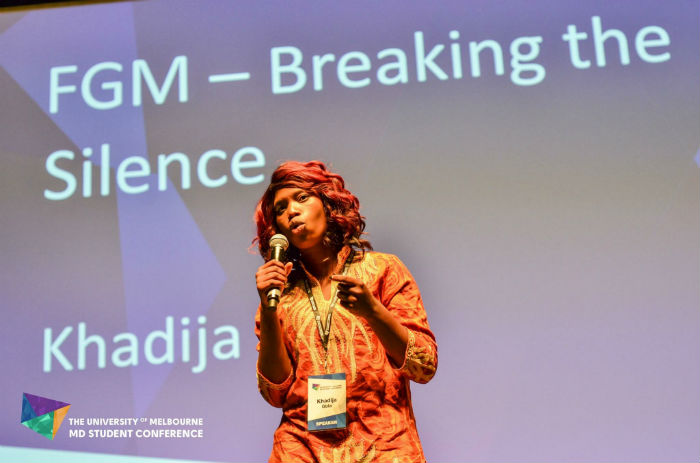
Prevention is key to tackling FGM and we can’t undertake this work right now. The number of phone or email referrals – which is one of the main avenues victims or front line staff use to reach out for help – I have received has dropped off dramatically in the last few months, which indicates a rise of silent cases happening behind closed doors.
The girls are harder to reach.
The UN is striving for FGM to be eradicated by 2030. Before the COVID-19 pandemic broke out, anti-FGM campaigners like myself were feeling positive that the scaling up of prevention programs over the next 10 years would mean 5.3 million fewer women being cut. But we now face significant cuts to funding, which means this number could be reduced by a third. It’s devastating.
FGM is child abuse; it is violence against women. It’s saying that women don’t have a right to sexual pleasure; it’s saying we don’t have a right to our bodies. But I say no to that, and you can say no to FGM, too. We must break the silence and the secrecy.
FGM is a painful procedure that violates girls’ most basic right to protection and control over their bodies.
Will you help empower women and girls to know their rights?

